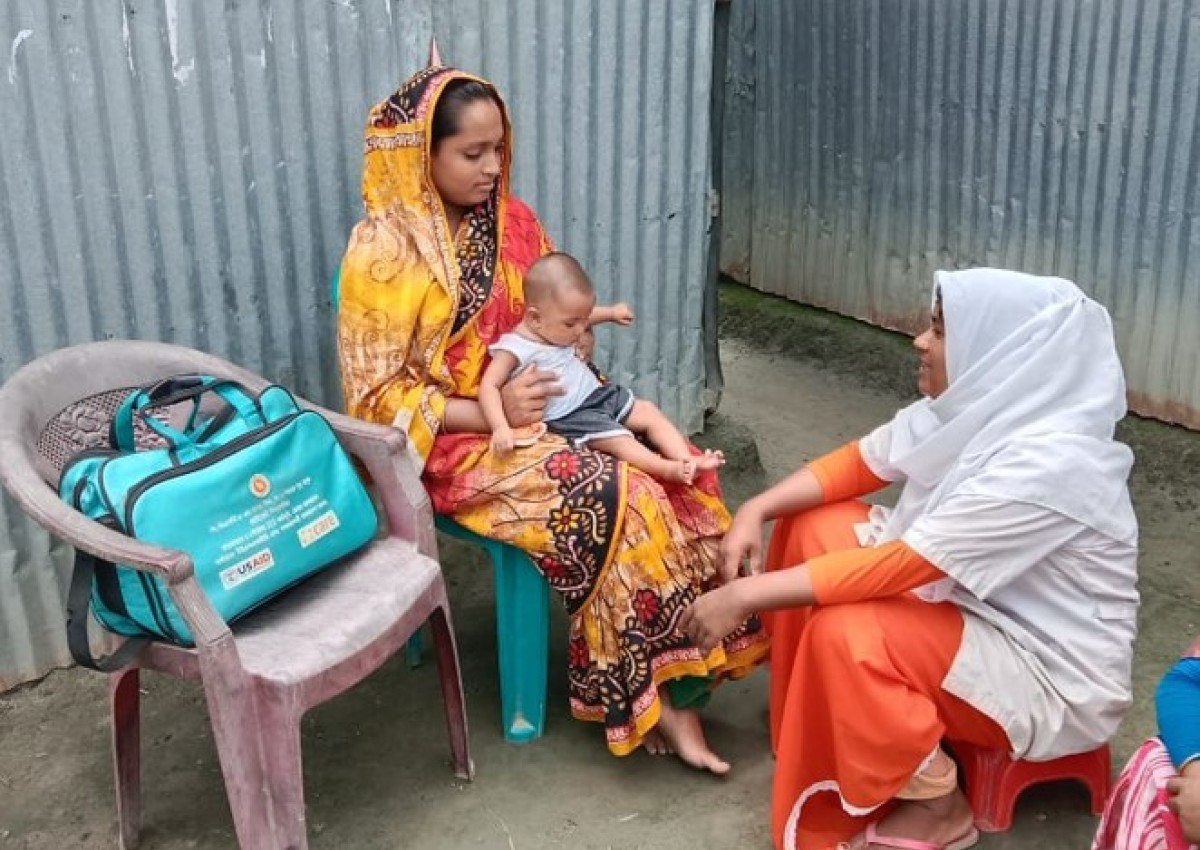





Shirina is advising a lactating mother
Background
USAID’s Strengthening Household Ability to Respond to Development Opportunities (SHOUHARDO) III Plus Program implemented a new phase of local service providers (LSPs) in early 2021 with the aim of improving support systems for pregnant women in the remote Char and Haor regions in northern Bangladesh.
One of the hallmark features of USAID’s Strengthening Household Ability to Respond to Development Opportunities (SHOUHARDO) III Plus Program is the recruitment, training, and deployment of Local Service Providers (LSPs) to bridge the gap between the private and public sectors. In order to improve support systems for pregnant women in the remote Char and Hoar regions of Bangladesh, Private Community Skilled Birth Attendants (PCSBAs) were introduced. This was done with CARE Bangladesh serving as the implementing partner.
PCSBAs are local women who are selected from within their respective communities to be trained and accredited as skilled birth attendants by the Bangladesh Nursing Council (BNC). PCSBAs provide a number of vital services including promoting institutional delivery, birth preparedness planning, and providing skilled assistance for uncomplicated births for women who still prefer a home delivery. They are particularly vital in bridging the major service gaps that exist by practicing in hard-to-reach areas where government services are limited or unavailable.
PCSBA Shirina : Saving lives of mother and children in the remote Char
 Shirina Khatun (26) is a PCSBA and resident of Fazlupur, a union approximately 25 kilometers from the district administrative headquarters in the Fulchuri Upazila in Gaibandha district, Char region of Northern Bangladesh. Chars are sedimentary islands either in rivers or attached to river banks, and are major geographical feature in Bangladesh. Given the remote nature of these Chars, residents are often geographically isolated from metropolitan city centers and major institutions such as hospitals.
Shirina Khatun (26) is a PCSBA and resident of Fazlupur, a union approximately 25 kilometers from the district administrative headquarters in the Fulchuri Upazila in Gaibandha district, Char region of Northern Bangladesh. Chars are sedimentary islands either in rivers or attached to river banks, and are major geographical feature in Bangladesh. Given the remote nature of these Chars, residents are often geographically isolated from metropolitan city centers and major institutions such as hospitals.
Most people living on the Khatiamari Char of Fazlupur are extremely poor, and to visit a specialist doctor, they need to travel 15 kilometers by boat, and ten kilometers by road, which is costly for many families. During the dry season, the commute requires even more transportation mediums including walking, horse wagon, and boat. The physical hardship of the journey makes it difficult, so pregnant women often do not go for medical health checkups for the duration of their pregnancies.
Shirina received six months of residential training between March and August of 2021 in the government’s accredited Private Community Skilled Birth Attendant (PCSBA) program. This program is administered by the BNC, which is government accredited. The Government of Bangladesh encourages institutional delivery to prevent maternal and child mortality, but because of the socio-economic conditions and remoteness of Chars like Khatiamari, residents prefer home deliveries. Deliveries at home are usually safe if a PCSBA is available and there are no known complications with the pregnancy.
After successfully completing her training, Shirina has conducted more than 60 safe home birth deliveries in Fazlupur Union in one and a half years, and as a result she has garnered social recognition. Shirina is an example for her community by helping to reduce maternal mortality and by empowering many women to have safe, affordable, convenient home deliveries when appropriate.
Shirina regularly visits pregnant women in three villages of Fazlupur union, where she provides health checkups, lifestyle and nutrition counseling, and supports them with visiting doctors and accessing pregnancy health check-ups. Before Shirina, there were no Skilled Birth Attendants (SBAs) in Khatiamari Char, and pregnant women who desired safe, in-home deliveries had no option except for Traditional Birth Attendants(TBAs). As a result, there have been unfortunate incidents of maternal mortality in the past due to infections to mother and child, fetal injury; including the death of both mother and child. PCSBAs play a vital role in preventing further deaths in local communities marginalized from major medical care.
© Copyright 2026 CARE Bangladesh. Powered By Bangladesh Online